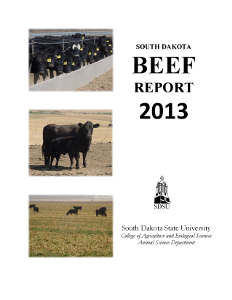Document Type
Report
Report Number
2013-2
Publication Date
2013
Summary
There are many cellular regulatory factors that ultimately determine the intramuscular fat, or marbling content and quality of beef carcasses. Identifying factors which play a critical role in the development of intramuscular fat throughout the feeding period and determining how cattle feeders can manipulate these factors will be crucial to continue improving beef quality. Ideally, marbling must increase without excess accumulation of adipose in depots that are undesirable and economically detrimental (subcutaneous and visceral). The results of this study are novel as they show not only what cellular factors play a role in marbling development, but also how their expression and presence change as an animal grows in an American‐style production system. The increase in both expression and presence of peroxisome proliferator‐activated receptor γ (PPARγ) at the end of the feeding phase suggest the proliferation and differentiation of additional cells to adipocytes is required in order to increase intramuscular fat content. This does not mean that adipocyte filling (lipogenesis) does not play a key role as well. However marbling content will reach a plateau without the recruitment of additional adipocytes. While it has been previously established that intramuscular adipocytes have a pattern of metabolism unique to other adipocytes, further research into how the metabolism of intramuscular fat differs from other fat depots and how this metabolism changes throughout the feeding phase will enhance the ability to produce high quality carcasses while limiting undesirable carcass fat.
Number of Pages
6
Format
application/pdf
Language
en
Publisher
South Dakota State University
Rights
Copyright © 2013 South Dakota State University
Recommended Citation
Kern, S.A.; Pritchard, R.H.; Scramlin, S.M.; Holland, B.P.; Blair, A.D.; and Underwood, K.R., "The Influence of Growth Stage on Carcass Compositionand Factors Associated with Marbling Development in Beef Cattle" (2013). South Dakota Beef Report, 2013. 3.
https://openprairie.sdstate.edu/sd_beefreport_2013/3

